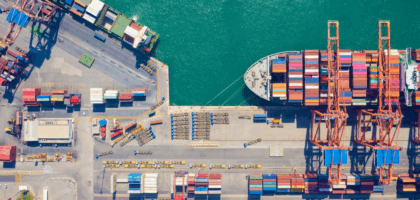Tropical storm season lasts from June 1st to November 30th. Coincidentally, this also falls during peak freight season. With the high potential for severe weather during this time, these natural disasters can easily disrupt supply chains, delay shipments, and bring numerous logistics challenges.
Tropical Storms vs. The Supply Chain
There are three kinds of tropical storms: hurricanes, cyclones, and typhoons. The National Oceanic and Atmospheric Administration (NOAA) has predicted an 85% chance of having an above-average hurricane season this year. It’s safe to assume that all modes of freight transportation can be affected by these storms. Tropical storms can bring strong winds, heavy rain, and damage to the environment. But how exactly do these weather-related events affect the global supply chain?
Damage to Infrastructure
Following a major storm, ports and depots may experience severe damage to roads, bridges, and buildings. Other equipment, such as trailers or cranes, may also sustain damage from falling debris or flooding. This can set back or even halt logistics operations from executing their usual day-to-day tasks.
Increased Costs
Delays caused by tropical storms can lead to substantial economic costs to logistics processes. It’s estimated that delays cost shippers about $56 per hour. Since storms can delay freight for several days, the value can quickly add up to thousands of dollars. Costs for resources and fuel can also increase during a storm, adding to the overall surge in expenses.
Transportation Disruptions
Roads can become flooded or blocked by fallen debris, making it difficult for trucks and other vehicles to transport goods. Port closures halt the movement of cargo ships, which delay both imports and exports. Similar effects are seen with airport and railway blockages and closures. Finding alternate routes can be difficult and often lead to extended shipping times.
Communication Challenges
Power outages are extremely common during tropical storms. This inevitably leads to communication issues, making it difficult for logistics professionals to coordinate efforts and keep up with real-time updates. Emergency preparedness for incoming storms can help alleviate the stressful situation of limited communication access with carriers and customers during the storm.
As we navigate through this storm season, we have already faced several tropical storms that have heavily impacted logistics processes. These disruptions have highlighted just how vulnerable the supply chain is, emphasizing the need for contingency plans. By understanding the effects these tropical storms have, logistics professionals can better prepare to address the challenges that arise and maintain seamless supply chain processes.
Resources:
- Supply Chain Hurricanes: Challenges and Solutions (SupplyChain360)
- How Does Hurricane Season Impact Freight? (InTek)
- The Impact of Hurricanes on Supply Chain (WeatherOptics)
- 5 Ways Weather Impacts Freight Shipments (FreightWaves)
- Timeline of Storms in the 2024 Hurricane Season (Yahoo)



